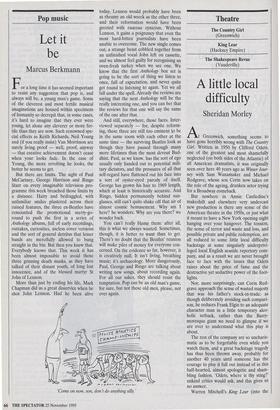Pop music
Let it be
Marcus Berkmann
For a long time it has seemed important to resist any suggestion that pop is, and always will be, a young man's game. Some of the cleverest and most fertile musical imaginations are housed within specimens of humanity so decrepit that, in some cases, it's hard to imagine that they ever were young, let alone any cleverer or more fer- tile than they are now. Such renowned spe- cial effects as Keith Richards, Neil Young and (if you really insist) Van Morrisson are surely living proof — well, proof, anyway — that creative achievement doesn't cease when your looks fade. In the case of Young, the more revolting he looks, the better he seems to get.
But there are limits. The sight of Paul McCartney, George Harrison and Ringo Starr on every imaginable television pro- gramme this week breached those limits by a distance. Hairy and bedraggled, with unfamiliar smiles plastered across their ruined features, the three ex-Beatles have remounted the promotional merry-go- round to push the first in a series of Anthology albums, full of early recordings, outtakes, curiosities, useless cover versions and the sort of general detritus that lesser bands are mercifully allowed to bung straight in the bin. But then you knew that. Everybody knows that. This week it has been almost impossible to avoid those three grinning death masks, as they have talked of their distant youth, of long lost innocence, and of the blessed martyr St John of Lennon.
More than just by ending his life, Mark Chapman did us a great disserVice when he shot John Lennon. Had he been alive today, Lennon would probably have been as rheumy an old wreck as the other three, and their reformation would have been greeted with raucous cynicism. Without Lennon, it gains a poignancy that even the most hard-bitten journalists have been unable to overcome. The new single comes out, a strange beast cobbled together from an unfinished vocal John left on cassette, and we almost feel guilty for recognising an oven-fresh turkey when we see one. We know that the first Anthology box set is going to be the sort of thing we listen to once, full of expectation, and never quite get round to listening to again. Yet we all fall under the spell. Already the reviews are saying that the next Anthology will be the really interesting one, and you can bet that the reviews for that one will say the same of the one after that.
And still, everywhere, those faces. Inter- viewed separately — for, despite reform- ing, these three are still too eminent tp be in the same room with each other at the same time — the surviving Beatles look as though they have passed through many more lifetimes than the most devout Bud- dhist. Paul, as we know, has the sort of ego usually only handed out to potential mili- tary dictators, and the pressures of all that self-regard have flattened out his face into a sort of oyster-eyed parody of itself. George has grown his hair to 1969 length, which at least is historically accurate. And Ringo, hidden permanently behind sun- glasses, still can't quite shake off that air of almost cosmic bemusement. Why am I here? he wonders. Why are you there? we wonder back.
You can't really blame them: after all, this is what we always wanted. Sometimes, though, it is better to want than to get. There's no doubt that the Beatles' reunion will make piles of money for everyone con- cerned. On the evidence so far, however, it is creatively null. It isn't living, breathing music; it's archaeology. More dangerously, Paul, George and Ringo are talking about writing new songs, about recording again. For all our sakes, they should resist the temptation. Pop can be an old man's game, for sure, but not these old men, please, not ever again.
`Come on now, son, don't do anything silly.'


















































































 Previous page
Previous page